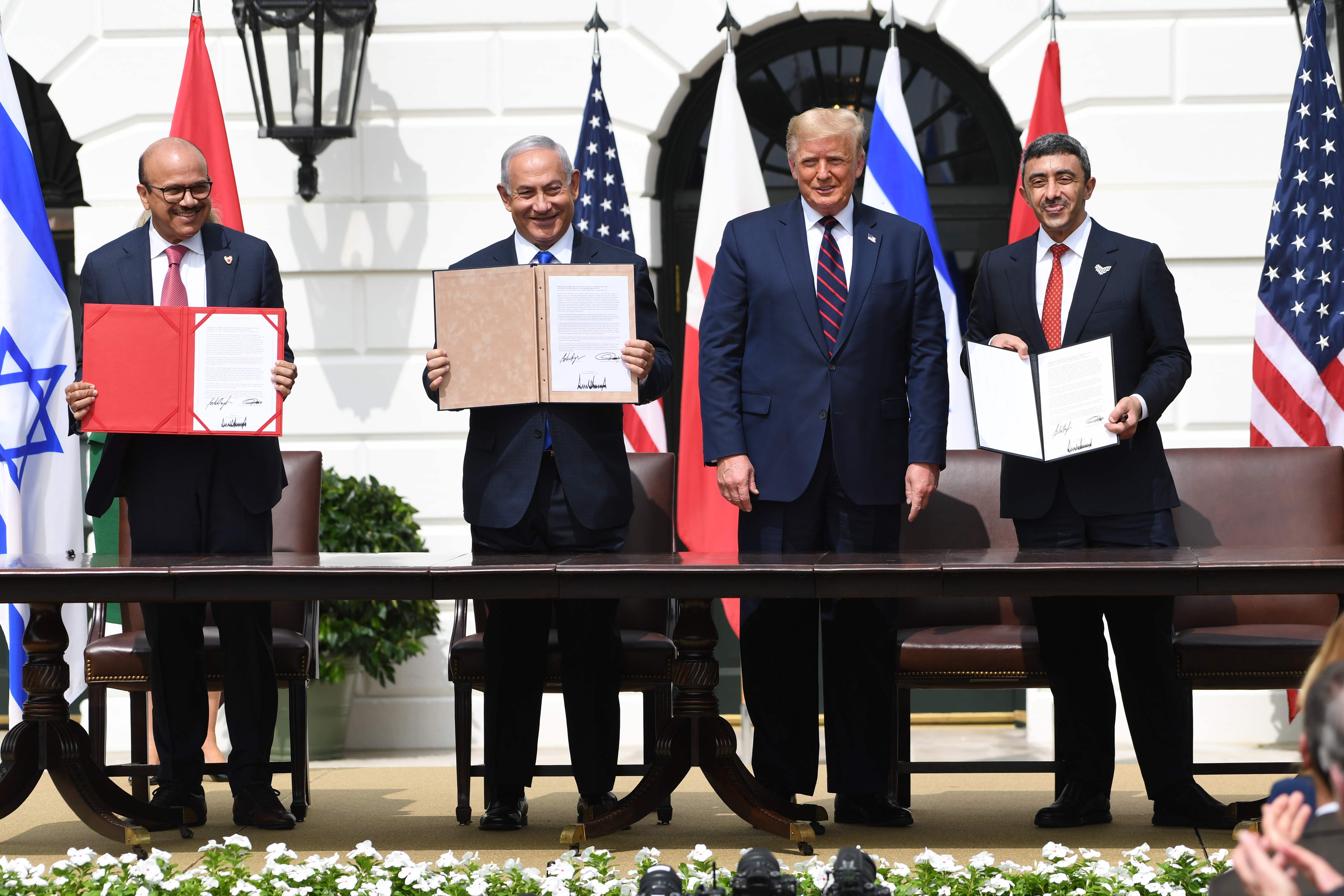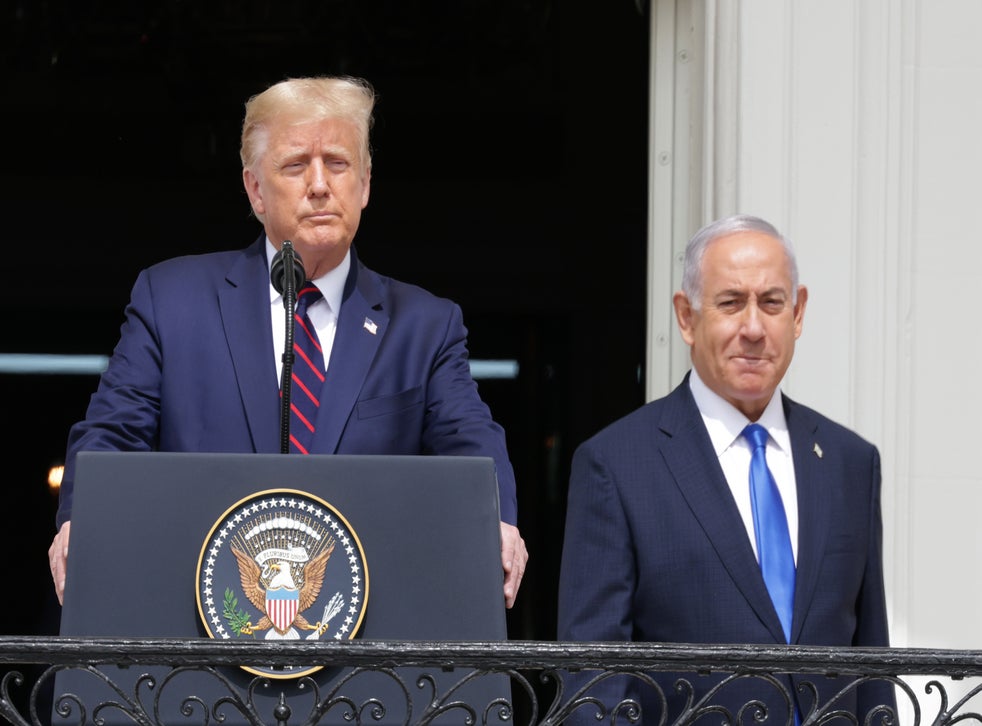
The United Arab Emirates and Bahrain have signed a historic deal with Israel, becoming the first Gulf states to formally normalise relations, in a move which dramatically re-shapes political dynamics in the region.
US President Donald Trump hosted the ceremony at the White House on Tuesday, capping several fraught few weeks since UAE and Bahrain first agreed to forge diplomatic relations with Israel despite no formal resolution to the 70-year-old Israel-Palestinian conflict.
At the US-brokered event, attended by some 700 attendees, Israeli prime minister Benjamin Netanyahu signed the “Abraham Accords” alongside Emirati foreign minister Sheikh Abdullah bin Zayed al-Nahyan and Bahraini foreign minister Abdullatif Al Zayani.
Mr Trump, who is up for re-election in November, congratulated the three countries on this “outstanding achievement” saying the moment marks “the dawn of a new Middle East”.
“The Abraham accords … will serve as a foundation for a comprehensive peace across the entire region something that no one thought was possible,” Mr Trump said.
“[It] also open the doors for Muslims to visit the historic site in Israel,” he said referencing the Al-Aqsa mosque in Jerusalem. He said there are other countries which will “very, very soon” follow suit, echoing previous comments that “five or six” other nations were considering signing deals with Israel.
“The Abraham accords… will serve as a foundation for a comprehension peace across the entire region something that no one thought was possible,” Mr Trump said. “[It] also open the doors for Muslims to visit the historic site in Israel,” he said referencing the Al-Aqsa mosques in Jerusalem. He said there are other countries which will “very, very soon” follow suit, echoing previous comments that “five or six” other nations were considering signing deals with Israel.
“The peace we make today will endure,” he added.
The Emirati foreign minister, brother of Abu Dhabi’s powerful crown prince, thanked Mr Netanyahu for “halting” the annexation of the Palestinian territories, a sticking point in discussions leading up to the deal. As he came to the podium, sirens sounded in southern Israel, and the Israeli military said two rockets were fired from Gaza.
“Today we are witnessing a change in heart in the Middle East, a change that will send hope around the world,” he said, adding that the accord would build a “more prosperous and secure future”.
Bahrain’s foreign minister, meanwhile, called the deal “an important first step” in working on a “just, comprehensive and enduring two-state solution to the Israeli-Palestinian conflict”.
The agreements, which do not end active wars but establish relations, hand a significant diplomatic victory to Mr Trump while he is up for re-election in November, shoring up support among pro-Israel-Christian evangelical voters. The American president hinted at more deals ahead saying there are “at least five or six countries” ready to follow suit and normalise relations with Israel.

There were reports that Oman’s ambassador to Washington attended the event, fuelling speculation Muscat, that hosted Mr Netanyahu in 2018, may be the next to sign a deal.
Notably absent during the ceremony was any proper mention of the Palestinians who have vehemently rejected the accords.
The US president instead had issued apparent warnings to the Palestinian leadership in a meeting at the Oval office before the signing began.
“If they’re not going to respect us, we're not going to be involved,” he said, accusing the Palestinian side of not “saying nice things” about the United States. He sent a reminder that he “stopped payment” on American aid to the Palestinians over such remarks.
The Palestinian leadership had labelled the accords a “stab in the back” and a “betrayal” because they believe Israel has promised nothing tangible in exchange for normalisation.
The deal is supposedly rooted in the Saudi Arabia-led Arab Peace Initiative, which stated that Israel would only win full recognition from the Arab world if it resolved the conflict with the Palestinians and granted them the right to an independent state.
The Palestinian leadership has said that the deal does not do this but effectively rewards Israeli for its actions instead.
The Emiratis have rejected this reading of the deal, saying that it secures the suspension of Israel’s imminent plan to annex swathes of Palestinian territory, which is illegal under international law. Bahrain has said it helps move towards a two-state solution to the crisis.
The accord came at an advantageous time for the signatories.
Mr Netanyahu has used the agreement to win support back home, particularly after he was indicted on corruption charges in January and only just managed to remain prime minister after forging a shaky deal with his elections rival in April.
The UAE and Bahrain, meanwhile, are looking to wean their countries off a dependency on an oil economy, and have talked about the benefits of the trade deals with Israel.
One of the thorniest issues connected to the accord remains the US’s potential sale of F-35 stealth fighter jets to the UAE, a sale Israel has vehemently rejected on the grounds it would destroy their “qualitative military edge”.
Just ahead of the signing ceremony Mr Trump confirmed that Washington would have “no problem” with selling advanced fighter jets to Abu Dhabi and later said the differences with Israel over the F-35 sales to the UAE “is going to be very easy to work out.”







